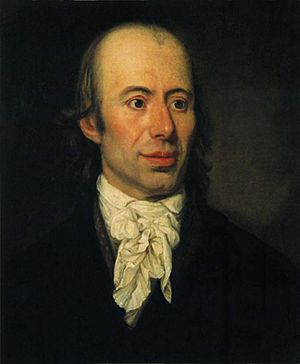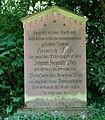Johann Heinrich Voss facts for kids
Johann Heinrich Voss (born February 20, 1751 – died March 29, 1826) was a German scholar and poet. He is best known for translating ancient Greek and Roman stories into German. His most famous translations are Homer's Odyssey (published in 1781) and Iliad (published in 1793). These works helped many German people enjoy these classic tales.
Contents
Life of Johann Heinrich Voss
Voss was born in a small town called Sommersdorf in Mecklenburg-Strelitz. His father was a farmer. From 1766 to 1769, he attended a school called Gymnasium in Neubrandenburg. After school, he had to work as a private tutor. This job helped him earn money so he could go to university.
In 1772, a writer named Heinrich Christian Boie invited Voss to the University of Göttingen. Boie had noticed Voss's poems in a magazine called Göttinger Musenalmanach. At the university, Voss studied philology. This means he studied languages and literature, both old (classical) and new. He became an important member of a famous group of poets called the Hain or Dichterbund.
In 1775, Boie handed over the job of editing the Musenalmanach to Voss. Voss continued to publish this magazine for several years. He married Boie's sister, Ernestine, in 1777.
In 1778, Voss became the headmaster (rector) of a school in Otterndorf. In 1781, he published his German translation of Homer's Odyssey. This translation made the ancient Greek poem very popular among Germans.
Voss moved to Eutin in 1782 to become the headmaster of another school. While there, he translated more classic works. In 1789, he published his translations of Virgil's Eclogues and Georgics. In 1793, his translation of Homer's Iliad was released. He also published some letters about mythology.
In 1802, Voss retired from his job in Eutin and moved to Jena. He received a good pension. In 1805, he accepted a job as a professor at the University of Heidelberg. Even though the famous writer Johann Wolfgang von Goethe tried to convince him to stay in Jena, Voss moved. In Heidelberg, he focused completely on his writing, translations, and studies of ancient times until he passed away.
Works of Johann Heinrich Voss
Voss was known for being a very strong and independent person. He created many important works during his life.
Original Poems and Essays
From 1785 to 1795, Voss published a collection of his own poems in two books. He added more poems to these later. A full collection of his poems was published in 1825.
His most famous original poem is called Luise. It was first printed in 1783 and then changed and re-released in 1795. In Luise, Voss tried to use the style of ancient classical poetry to express modern German feelings and ideas. He also wrote other works that were serious and thoughtful.
Many composers of his time set Voss's poems to music. These included C.P.E. Bach and Felix Mendelssohn. Voss liked a simple, folk-like style for songs.
Voss also wrote important essays about mythology. He believed people should have the freedom to think for themselves about religion. He wrote a powerful article in 1819 about a friend who changed his religion.
Famous Translations
Voss is most famous for his translations. His translations showed that he was a great scholar. He also understood how to make German words and rhythms sound right.
His translations of Homer's Odyssey and Iliad are the most well-known. The Odyssey translation from 1781 is considered his best. He also translated works by other ancient writers like Hesiod (in 1806) and Virgil (in 1799). He translated Horace (in 1806) and other Roman poets.
From 1818 to 1829, Voss worked with his sons, Heinrich and Abraham, to translate the plays of William Shakespeare. His sons were also talented scholars and writers.
Voss's complete poetic works were published by his son Abraham in 1835. Voss also wrote a short story about his own life in 1818.
Voss is also thought to be the source of a famous German saying: Wein, Weib und Gesang. This means "wine, women, and song." The full saying is: "He who loves not wine, woman and song / Remains a fool his whole life long."
Images for kids
See also
 In Spanish: Johann Heinrich Voss para niños
In Spanish: Johann Heinrich Voss para niños
 | Bessie Coleman |
 | Spann Watson |
 | Jill E. Brown |
 | Sherman W. White |




